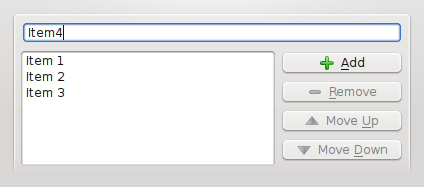KEditListWidget Class
An editable listbox. More...
| Header: | #include <KEditListWidget> |
| CMake: | find_package(KF6 REQUIRED COMPONENTS WidgetsAddons)target_link_libraries(mytarget PRIVATE KF6::WidgetsAddons) |
| Inherits: | QWidget |
Public Types
| class | CustomEditor |
| enum | Button { Add, Remove, UpDown, All } |
| flags | Buttons |
Properties
- buttons : Buttons
- checkAtEntering : bool
- items : QStringList
Public Functions
| KEditListWidget(QWidget *parent = nullptr) | |
| KEditListWidget(const KEditListWidget::CustomEditor &customEditor, QWidget *parent = nullptr, bool checkAtEntering = false, KEditListWidget::Buttons buttons = All) | |
| QPushButton * | addButton() const |
| KEditListWidget::Buttons | buttons() const |
| bool | checkAtEntering() |
| void | clear() |
| int | count() const |
| int | currentItem() const |
| QString | currentText() const |
| QPushButton * | downButton() const |
| void | insertItem(const QString &text, int index = -1) |
| void | insertStringList(const QStringList &list, int index = -1) |
| QStringList | items() const |
| QLineEdit * | lineEdit() const |
| QListView * | listView() const |
| QPushButton * | removeButton() const |
| void | setButtons(KEditListWidget::Buttons buttons) |
| void | setCheckAtEntering(bool check) |
| void | setCustomEditor(const KEditListWidget::CustomEditor &editor) |
| void | setItems(const QStringList &items) |
| QString | text(int index) const |
| QPushButton * | upButton() const |
Signals
Detailed Description
This class provides an editable listbox, this means a listbox which is accompanied by a line edit to enter new items into the listbox and pushbuttons to add and remove items from the listbox and two buttons to move items up and down.

Member Type Documentation
enum KEditListWidget::Button
flags KEditListWidget::Buttons
Enumeration of the buttons, the listbox offers. Specify them in the constructor in the buttons parameter, or in setButtons.
| Constant | Value |
|---|---|
KEditListWidget::Add | 0x0001 |
KEditListWidget::Remove | 0x0002 |
KEditListWidget::UpDown | 0x0004 |
KEditListWidget::All | Add | Remove | UpDown |
The Buttons type is a typedef for QFlags<Button>. It stores an OR combination of Button values.
Property Documentation
buttons : Buttons
Access functions:
| KEditListWidget::Buttons | buttons() const |
| void | setButtons(KEditListWidget::Buttons buttons) |
checkAtEntering : bool
Access functions:
| bool | checkAtEntering() |
| void | setCheckAtEntering(bool check) |
items : QStringList
Access functions:
Notifier signal:
| void | changed() |
Member Function Documentation
[explicit] KEditListWidget::KEditListWidget(QWidget *parent = nullptr)
Create an editable listbox.
KEditListWidget::KEditListWidget(const KEditListWidget::CustomEditor &customEditor, QWidget *parent = nullptr, bool checkAtEntering = false, KEditListWidget::Buttons buttons = All)
Constructor which allows to use a custom editing widget instead of the standard QLineEdit widget. E.g. you can use a KUrlRequester or a QComboBox as input widget. The custom editor must consist of a lineedit and optionally another widget that is used as representation. A QComboBox or a KUrlRequester have a QLineEdit as child-widget for example, so the QComboBox is used as the representation widget.
See also KUrlRequester::customEditor() and setCustomEditor.
QPushButton *KEditListWidget::addButton() const
Returns a pointer to the Add button
[signal] void KEditListWidget::added(const QString &text)
This signal is emitted when the user adds a new string to the list, the parameter is the added string.
KEditListWidget::Buttons KEditListWidget::buttons() const
Returns which buttons are visible
Note: Getter function for property buttons.
See also setButtons().
bool KEditListWidget::checkAtEntering()
Returns true if check at entering is enabled.
Note: Getter function for property checkAtEntering.
See also setCheckAtEntering().
void KEditListWidget::clear()
Clears both the listbox and the line edit.
int KEditListWidget::count() const
Returns the count of elements in the list
int KEditListWidget::currentItem() const
Returns the currently selected item
QString KEditListWidget::currentText() const
Returns the currently selected item's text
QPushButton *KEditListWidget::downButton() const
Returns a pointer to the Down button
void KEditListWidget::insertItem(const QString &text, int index = -1)
Inserts a text element at the index position If index is negative, the element will be appended
void KEditListWidget::insertStringList(const QStringList &list, int index = -1)
Inserts a list of elements from the index element If index is negative, the elements will be appended
QStringList KEditListWidget::items() const
Returns a list with the text of all items in the listbox
Note: Getter function for property items.
See also setItems().
QLineEdit *KEditListWidget::lineEdit() const
Returns a pointer to the embedded QLineEdit.
QListView *KEditListWidget::listView() const
Returns a pointer to the embedded QListView.
QPushButton *KEditListWidget::removeButton() const
Returns a pointer to the Remove button
[signal] void KEditListWidget::removed(const QString &text)
This signal is emitted when the user removes a string from the list, the parameter is the removed string.
void KEditListWidget::setButtons(KEditListWidget::Buttons buttons)
Specifies which buttons are visible
Note: Setter function for property buttons.
See also buttons().
void KEditListWidget::setCheckAtEntering(bool check)
If check is true, after every character you type in the line edit KEditListWidget will enable or disable the Add-button, depending whether the current content of the line edit is already in the listbox. Maybe this can become a performance hit with large lists on slow machines.
If check is false, it will be checked if you press the Add-button. It is not possible to enter items twice into the listbox. Default is false.
Note: Setter function for property checkAtEntering.
See also checkAtEntering().
void KEditListWidget::setCustomEditor(const KEditListWidget::CustomEditor &editor)
Allows to use a custom editing widget instead of the standard QLineEdit widget. E.g. you can use a KUrlRequester or a QComboBox as input widget. The custom editor must consist of a lineedit and optionally another widget that is used as representation. A QComboBox or a KUrlRequester have a QLineEdit as child-widget for example, so the QComboBox is used as the representation widget.
void KEditListWidget::setItems(const QStringList &items)
Clears the listbox and sets the contents to items
Note: Setter function for property items.
See also items().
QString KEditListWidget::text(int index) const
Returns the text at the index position
QPushButton *KEditListWidget::upButton() const
Returns a pointer to the Up button